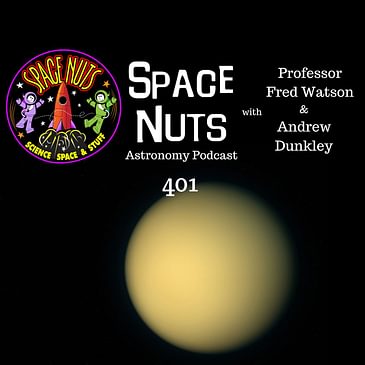Embark on a cosmic exploration with your favorite interstellar enthusiasts, Andrew Dunkley and Professor Fred Watson, in this latest episode of Space Nuts. Today's celestial journey takes us to Saturn's moon, Titan, where new research casts a shadow on the prospects of finding life in its sub-ice oceans. Despite the rich hydrocarbons on Titan's surface, the study by astrobiologist Catherine Neish suggests that the transfer of essential organic materials to the ocean below is far too slow to foster life as we know it. The implications of this finding could extend to other icy moons, potentially dampening hopes for habitability across our solar system.
Then, we pivot to Earthly matters as we join the United Nations' cosmic conversation. The UN has finally agreed to tackle the burgeoning issue of satellite constellations cluttering our orbit. With over 8,000 satellites circling our planet and plans for many more, astronomers are increasingly concerned about light pollution and radio interference. But can the UN's agenda lead to effective regulation, or will it be a case of too little, too late in the fast-paced space industry?
From the icy depths of Titan to the crowded skies of Earth, this episode of Space Nuts is a testament to the ever-evolving quest for knowledge and the challenges of preserving our cosmic frontiers. So, sit back, tune in, and let your imagination take flight as we unravel these astronomical enigmas.
For the full spectrum of space-time adventures and to keep your astronomical curiosity quenched, subscribe to Space Nuts on your preferred podcast platform. And don't forget to tune in to our Space Nuts Q&A episodes every Monday for more cosmic queries and celestial insights. Until next time, keep your eyes to the stars and your passion for discovery burning bright!
📋 Episode Chapters
(00:00) Professor Fred Watson joins us on this episode of Space Nuts
(02:02) New study suggests Titan's subsurface ocean could be right for potential life
(10:35) There have been speculations that Titan could have a different basis of life
(13:47) Andrew Dunkley says there will be methane and ethane rainbows on Titan
(15:32) United nations to meet later this year to discuss concentrations of satellites
(25:38) Space company SpaceX to deorbit 100 older starlink satellites to reduce satellite interference
Become a supporter of this podcast: https://www.spreaker.com/podcast/space-nuts--2631155/support.



